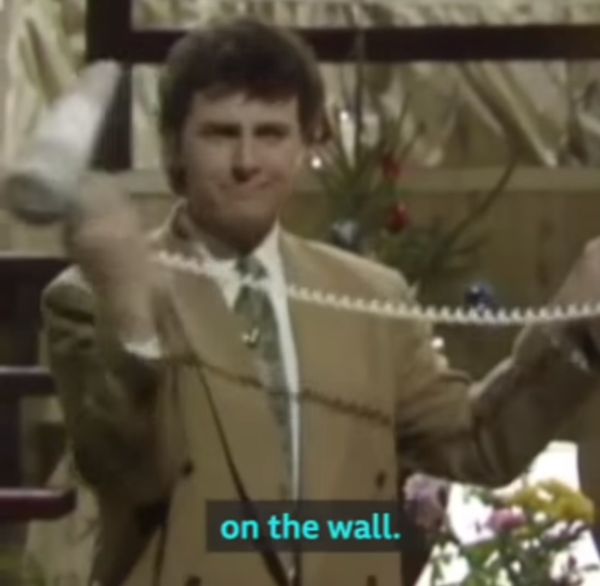- Visyon: The Catalan company that already works with technology that reads the mind
- Geomiq.A robotics company pays you 116,000 euros for 'the face'
Not only The Simpsons and Marty McFly (protagonist of Back to the Future) are able to predict the future, the BBC did its own thing more than 30 years ago and without the help of Doctor Who, the famous time traveler who stars in a series in the Same chain since 1963.
In 1989 the world was a very different place. There were no smartphones, computer science was still in diapers and the closest thing there was to the concept of 'influencer' were the models or singers, basically people who did more than take photos and attend events.
During that same year, while the strange Batman by Tim Burton and the third installment of Indiana Jones were screened in theaters, the BBC dared to prophesy about technology in 2020 . An expert played to imagine what would be the house of the average Briton in the same year in which we are currently. Let's see how much percentage of Nostradamus it had.
The 'pythoness', Christine MacNulty , CEO of Applied Futures, host of the program, also wrote two books on the future of technology; it is seen that he liked to prophesy. At the beginning of the clip, the expert states that "people will want all the benefits of modern technology without all the messy and complex devices we have today. In addition, the technology itself will be integrated into the structure of the house itself and its furniture". Wow, he nailed it.
Opaque crystals
Some predictions were hilarious at the time and they seem so now, like windows that can be converted directly into walls, but whose base does not differ at all with real technology.
Currently, there are different methods to make a glass opaque. One of these systems is a sheet with a chemical inside, which adheres to a crystal. This material reacts at a voltage of 220 volts and becomes opaque.
Other systems, such as the one created by the Harvard School of Engineering and Applied Sciences, work thanks to a sheet of glass wrapped in soft elastomers. Each layer of elastomers is coated with nanowires that, without electric charge, do not interrupt the passage of light, but that when receiving electric current react and are positioned in such a way that they return to the opaque glass.
In Spain, the CSIC, together with a team from the Institute of Materials Science in Madrid, designed another system in which, through exposure to wet or dry air, the particles of porous material that cover the glass change their optical transmission and achieve a switching or a transition from the transparent to the opaque state, without the need for electric current.
Wireless charger
The BBC expert goes a little further and as if Tesla's plans had gone well, he predicts that in 2020 we can connect any electrical device to the wall and with the mere contact of a pad, where there should be a plug male, it will work without problems. "The plugs become pads that collect energy from any part of the wall," says one of the presenters.
He also says that the walls will load devices, something that could fit reality with wireless phone chargers. To demonstrate this, in this case, instead of approaching a smartphone (which did not exist), the presenter approaches the end of a hair dryer cable on the wall and begins using it to dry and accommodate his carding. Blessed 80.
Voice control
For example, experts guessed that we could play music at home simply with voice commands, something currently possible thanks to Amazon's Alexa attendees and Google Home. "A simple command gives you music, perhaps entering from a sound library," says the presenter. Bearing in mind that, according to data from Toucan Toco, one of every five searches is carried out by voice, which according to Google, at the end of 2018 there were already 100 million smart speakers sold and that 70% of its use is related to the Music playback, we give the prediction as valid.
Automatic lights
Another of the bets of the video is that of automatic lights. They predict that they will be able to turn on and off taking into account our presence in the home; that is, lights connected to a motion detector. Not only this is real, but systems like the one launched by IKEA last year, Smart Home, allow you to install from Wi-Fi bulbs to electric shutters programmed to open when the alarm sounds, all controlled from the mobile or with voice commands. Come on, the democratization of home automation.
Climate change
MacNulty also makes a precise reference to climate change at the beginning, where the presenter speculates that "by 2020, there will be enormous pressure to reduce fossil fuels. This means that energy management in our homes will be vitally important." As an idea, it launches an intelligent central heating that only heats the rooms we are using.
The BBC predicted a promising future in terms of technology, but devastating in terms of the environment. Both realities coexist today in the year 2020. Who will know what 2050, transhumanism, the colonization of other planets holds for us ... Meanwhile, we are waiting for a new BBC prediction.
According to the criteria of The Trust Project
Know more- Ikea
Security Alert for a WiFi failure that affects hundreds of millions of mobiles, routers and computers
Family Scandal on Google: thus "spying" millions of children at school and at home
Telecommunications Ericsson will not attend the Mobile World Congress in Barcelona for the coronavirus

